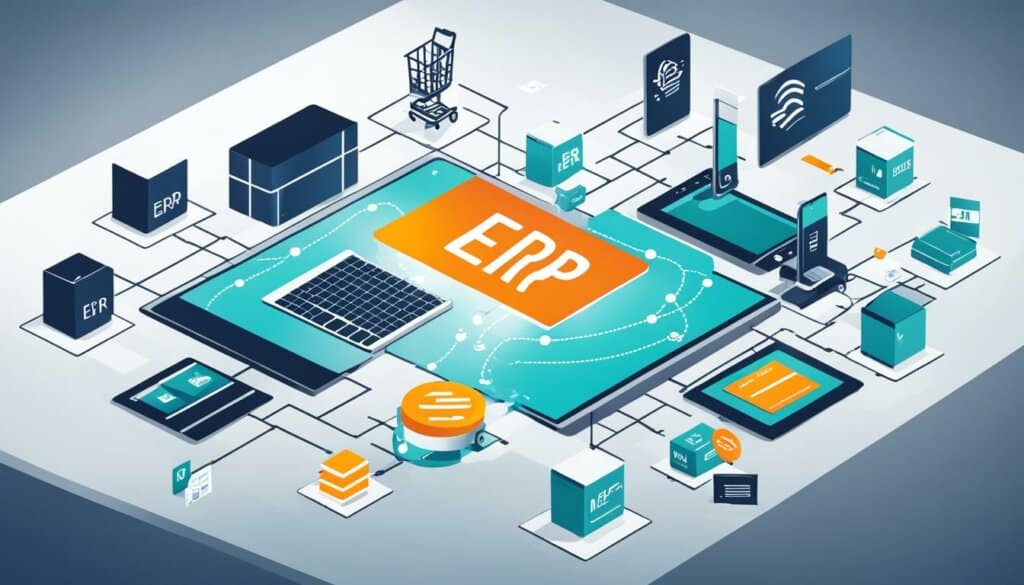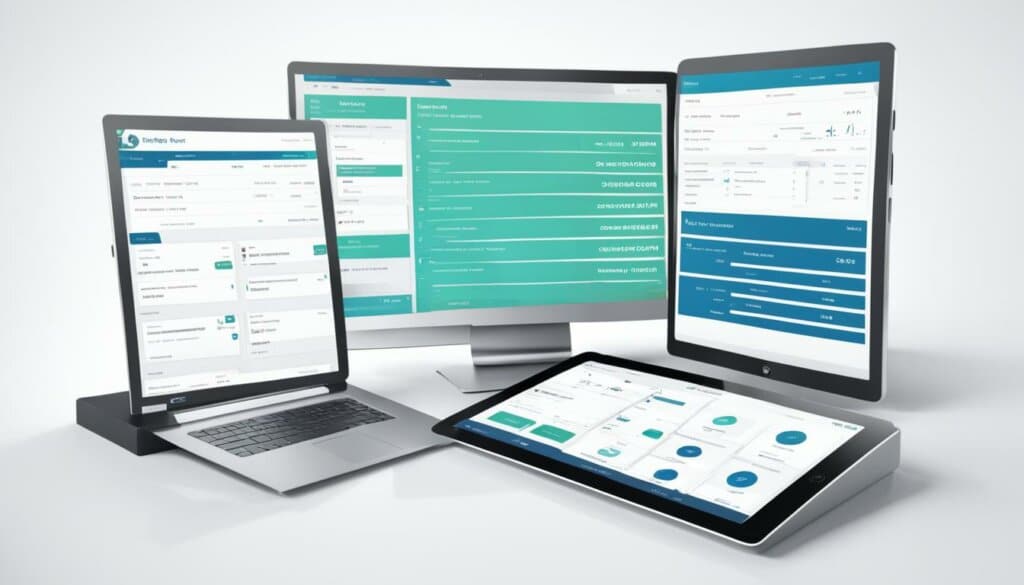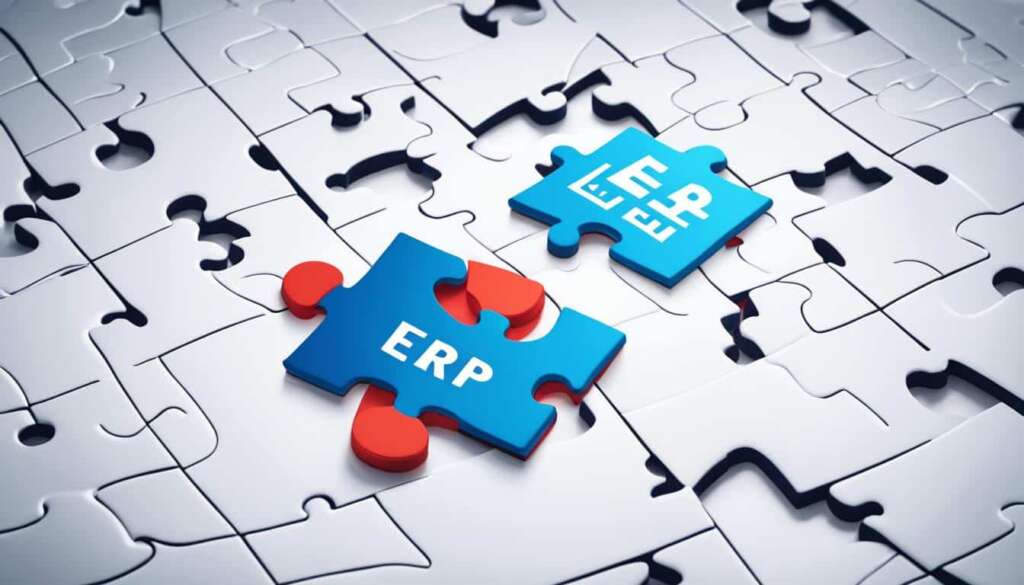Table of Contents
By integrating your ERP system with your e-commerce platform, you can streamline your business operations and drive growth. ERP e-commerce integration allows for seamless communication and data exchange between the two systems, eliminating the need for manual data transfer and ensuring accurate information. This integration enhances operational efficiency, improves decision-making through data-driven insights, and provides a unified view of all enterprise applications.
In today’s competitive business landscape, harnessing the power of ERP e-commerce integration is essential for sustainable growth and success. Whether you are a small business or a multinational corporation, the seamless integration of your ERP system with your e-commerce platform can significantly impact your business’s efficiency and bottom line.
Implementing ERP e-commerce integration enables you to consolidate and streamline your data, automate tasks, and gain real-time visibility into your operations. Through this integration, you can optimize your inventory management, enhance customer experiences, and make informed business decisions based on accurate, up-to-date information.
ERP e-commerce integration offers numerous benefits, including improved productivity, reduced costs, and enhanced customer satisfaction. By automating processes, minimizing errors, and providing a seamless experience for your customers, you can drive growth and competitive advantage in the dynamic e-commerce marketplace.
In the following sections, we will explore what ERP e-commerce integration is, how it works, the advantages it offers, and the vital features to consider. We will also discuss different types of ERP systems and e-commerce solutions available, as well as key factors to keep in mind when choosing an ERP-integrated e-commerce platform. Finally, we will conclude with a look at the importance of integrating ERP with your e-commerce platform for future-proofing your business and achieving long-term success.
What is ERP eCommerce Integration?
ERP eCommerce integration is a process that connects an organization’s e-commerce platform with its Enterprise Resource Planning (ERP) system. It enables seamless communication and data exchange between the two systems, eliminating the need for manual data transfer and ensuring accuracy. This integration allows businesses to access, manage, and analyze their data within a single interface, improving operational efficiency and productivity.
By integrating ERP and e-commerce systems, businesses can achieve a synergistic relationship that unlocks numerous benefits. ERP eCommerce integration facilitates the exchange of information between the two systems, enabling real-time updates and synchronization of data. This seamless communication streamlines processes, automates workflows, and ensures data accuracy, resulting in improved operational efficiency and enhanced decision-making.
With ERP eCommerce integration, businesses can access and manage key business data, such as orders, inventory, and customer information, within a unified interface. This centralized view of data enables businesses to analyze trends, identify opportunities, and make data-driven decisions to drive growth and improve customer experiences.
By integrating ERP and e-commerce platforms, businesses can leverage the power of data to optimize their operations and stay competitive in the digital landscape.
The integration also eliminates the need for manual data entry and reduces the risk of errors that can occur during manual transfer. This saves time and resources, allowing employees to focus on more value-added tasks and improving overall productivity.
In summary, ERP eCommerce integration fosters seamless communication and data exchange between an organization’s e-commerce platform and ERP system. This integration enables businesses to streamline their operations, improve efficiency, and make data-driven decisions to achieve sustainable growth in the competitive e-commerce landscape.
How Does eCommerce ERP Integration Work?
eCommerce ERP integration works by establishing a seamless connection between the e-commerce platform and the ERP system. This allows for real-time data synchronization and centralizes the management of orders, inventory, and customer data. The integration streamlines processes, automates tasks, and improves operational efficiency. It reduces errors, increases productivity, and provides a comprehensive view of business operations.
When a customer places an order on an e-commerce platform, the integrated ERP system receives the order details and updates the inventory in real-time. This ensures accurate stock management and prevents overselling. Simultaneously, customer data is synchronized, allowing businesses to have a unified view of customer information and provide personalized experiences.
Data synchronization is a key aspect of eCommerce ERP integration. It ensures that information such as pricing, product details, and inventory levels are consistent across both platforms. Any updates made in the ERP system reflect instantly on the e-commerce platform, enabling real-time visibility of data for both customers and internal teams.
“The seamless connection between the e-commerce platform and the ERP system allows businesses to streamline their operations, automate processes, and achieve operational efficiency. By eliminating manual data transfer and ensuring accurate information, organizations can make informed decisions and optimize their business performance.”
The integration also enables centralized management of orders and fulfillment. When a customer places an order, it is processed and fulfilled using the capabilities of the ERP system. This includes generating invoices, tracking shipments, and managing returns and refunds. By centralizing these processes, businesses improve order accuracy, reduce fulfillment time, and enhance customer satisfaction.
Synchronization of Data and Operations
eCommerce ERP integration synchronizes data and operations across different departments within an organization. All teams have access to real-time information, enabling collaboration and streamlining workflows. For example, the finance department can generate accurate financial reports based on the synchronized order and sales data from the e-commerce platform and ERP system.
The combination of eCommerce and ERP functionalities enhances operational efficiency. Manual processes such as data entry, inventory reconciliation, and order tracking are automated, reducing the likelihood of errors and freeing up employee time for more strategic tasks.

Benefits of eCommerce ERP Integration
The integration of e-commerce and ERP systems offers several benefits to businesses:
- Improved operational efficiency: By eliminating manual data transfer and automating processes, businesses can achieve operational efficiency. This leads to cost savings, reduced errors, and increased productivity.
- Enhanced decision-making: Real-time data synchronization provides actionable insights that enable informed decision-making. Businesses can analyze sales trends, inventory levels, and customer data to drive strategic initiatives and optimize business performance.
- Better customer experience: The integration allows for a unified view of customer data, enabling businesses to provide personalized experiences and improve customer satisfaction. Automated processes like order tracking and faster response times contribute to a seamless customer journey.
eCommerce ERP integration empowers businesses by improving operational efficiency, streamlining processes, and providing valuable insights. It is a vital tool for organizations looking to thrive in the competitive e-commerce landscape.
| Benefits | Description |
|---|---|
| Operational Efficiency | Eliminates manual data transfer, automates processes, reduces errors, and increases productivity. |
| Improved Decision-Making | Real-time data synchronization provides actionable insights for informed decision-making and strategic initiatives. |
| Better Customer Experience | Unified view of customer data, personalized experiences, and streamlined processes contribute to a seamless customer journey. |
Advantages of ERP and eCommerce Integration
Integrating ERP and eCommerce offers several advantages to businesses. By consolidating data and automating tasks, it increases productivity and allows employees to focus on higher-level responsibilities. This improved efficiency leads to improved productivity and reduced manual effort.
One of the key benefits is the enhanced customer experience. ERP eCommerce integration provides improved Customer Relationship Management (CRM) capabilities, ensuring better customer service and increased customer satisfaction. Automation of payment and tracking processes also leads to faster onboarding and smoother transactions.
Improved data accessibility is another business benefit of ERP and eCommerce integration. Real-time data synchronization between the ERP system and eCommerce platform allows for accurate, up-to-date information across both systems. This enables informed decision-making and provides real-time insights into business operations.
The integration also streamlines processes for better efficiency. By eliminating the need for manual data transfer between systems, businesses can reduce errors and improve data accuracy. This reduces the time spent on administrative tasks, allowing employees to focus on more strategic activities.
Moreover, ERP and eCommerce integration contributes to cost savings. By optimizing inventory management and preventing overstocking, businesses can reduce carrying costs and minimize the risk of inventory obsolescence.
In summary, integrating ERP and eCommerce provides significant business benefits, including improved productivity, enhanced customer experience, improved data accessibility, streamlined processes, and cost savings.
| Business Benefits of ERP eCommerce Integration |
|---|
|
Next, we will explore the vital features of ERP systems for eCommerce businesses that further enhance operational efficiency and drive business growth.
Vital Features of ERP for eCommerce Businesses
ERP systems designed for eCommerce businesses offer various key features that support efficient operations and drive business growth. These features include:
- Automated Finances: Efficient management of accounts payable and receivable, ensuring accurate and timely financial transactions.
- Streamlined Order Tracking: Better visibility and customer satisfaction through a centralized system for tracking and managing orders.
- Improved Data Accessibility: Smarter decision-making enabled by easy access to real-time data, empowering businesses to respond quickly to market demands.
- Enhanced Process Visibility and Streamlining: A comprehensive view of business processes, allowing for better optimization and identification of inefficiencies.
The integration of ERP with eCommerce systems helps businesses identify inefficiencies, reduce costs, and optimize their operations for sustained growth. By leveraging these vital features, eCommerce businesses can enhance their efficiency, improve customer experiences, and drive business growth.
Types of ERP Systems and eCommerce Solutions
When it comes to integrating ERP systems with eCommerce platforms, there are various types of ERPs and eCommerce solutions available. Understanding these different options can help businesses make informed decisions for seamless integration and optimal functionality.
Types of ERP Systems
ERP systems can be categorized into three main types:
- Generalist ERPs: These ERPs are designed to automate financial management and procurement processes. They provide a comprehensive suite of features for efficient business operations.
- Modular ERPs: Modular ERPs offer the flexibility of independent component implementation. Businesses can select and integrate specific modules based on their unique requirements.
- ERP Suites: ERP suites provide a comprehensive integrated package that covers various aspects of business operations. They combine different modules into a unified system, ensuring seamless data flow and comprehensive functionality.
An understanding of these ERP types allows businesses to choose a system that aligns with their specific needs and goals. It’s important to assess the scalability, customization options, and compatibility of the ERP system to ensure a successful integration.
eCommerce Solutions for ERP Integration
Various eCommerce solutions are available to facilitate the integration of ERP systems. Here are some popular options:
- Connectors: Connectors are software tools that establish a connection between the ERP system and the eCommerce platform. They enable data synchronization and facilitate seamless communication.
- Add-ons: Add-ons are additional software components that enhance the functionality of the eCommerce platform. They can be integrated with an ERP system to extend its capabilities.
- Middleware: Middleware acts as a bridge between the ERP system and the eCommerce platform, facilitating data exchange and synchronization.
- Custom-built Integrations: Custom-built integrations are tailored solutions developed specifically for the integration of a particular ERP system with an eCommerce platform. They offer a high level of customization and fit the unique requirements of the business.
- Native Integrations: Native integrations refer to integrations that are built-in features of the ERP system and the eCommerce platform. They provide seamless connectivity and are designed to work together smoothly.
Businesses need to consider their specific requirements, budget, and scalability when selecting an eCommerce solution for ERP integration. Finding the right solution ensures a smooth integration process and maximizes the benefits of ERP systems for eCommerce operations.
| ERP Systems | eCommerce Solutions |
|---|---|
| Generalist ERPs | Connectors |
| Modular ERPs | Add-ons |
| ERP Suites | Middleware |
| Custom-built Integrations | |
| Native Integrations |
How to Choose an ERP-Integrated E-commerce Platform
When considering an ERP-integrated e-commerce platform, it is essential to assess several key factors to ensure optimal functionality and success. These key considerations include:
- Ability to update products directly from the ERP: Select a platform that allows seamless updating of products from the ERP system to the web store, ensuring real-time data synchronization. This feature eliminates manual data transfers, saving time and reducing the risk of errors.
- Scalability for future growth: Choose a platform that can accommodate your business’s growth and expansion. Look for solutions that offer scalability, allowing you to add more products, users, and features as your e-commerce operations evolve.
- Omnichannel functionality: A platform with omnichannel capabilities enables a seamless customer experience across multiple channels, such as web, mobile, and brick-and-mortar stores. This functionality enhances customer satisfaction, improves brand visibility, and increases sales opportunities.
- Type of ERP system used: Ensure that the chosen e-commerce platform is compatible with your ERP system. Different ERP systems may require specific integration methods or connectors, so selecting a platform that supports your ERP system is essential for successful integration.
- Compatibility with specific ERP systems and e-commerce platforms: Consider the compatibility between your ERP system and the e-commerce platform options. Some platforms offer native integrations with popular ERP systems, making the integration process smoother. Evaluate the compatibility options available and choose a platform that aligns with your ERP requirements.
Selecting the right ERP-integrated e-commerce platform is crucial in ensuring efficient integration and maximizing the benefits of ERP for your e-commerce operations. Take the time to evaluate your business needs, assess the platform’s features and compatibility, and make an informed decision that aligns with your long-term goals and growth strategies.

Conclusion
Integrating ERP with an e-commerce platform is essential for businesses looking to achieve success in the digital era. The seamless integration of ERP and e-commerce streamlines operations, enhances productivity, and improves customer experiences. By leveraging the power of real-time data, businesses can optimize decision-making and gain a competitive edge in the e-commerce landscape.
Not only does ERP e-commerce integration reduce costs, but it also increases efficiency by eliminating manual data transfer and ensuring data accuracy. This integration future-proofs businesses by providing scalability and agility, allowing them to adapt to changing market trends and customer demands.
To fully harness the benefits of ERP e-commerce integration, it is crucial for businesses to choose the right ERP-integrated e-commerce platform. By selecting a platform that aligns with their specific needs and seamlessly integrates with their ERP system, businesses can unlock the full potential of their ERP system and drive growth in the ever-evolving e-commerce industry.
FAQ
What are the benefits of integrating ERP with e-commerce?
Integrating ERP with e-commerce allows for streamlined business operations and drives growth. It enhances operational efficiency, improves decision-making through data-driven insights, and provides a unified view of all enterprise applications.
What is ERP e-commerce integration?
ERP e-commerce integration is a process that connects an organization’s e-commerce platform with its Enterprise Resource Planning (ERP) system. It enables seamless communication and data exchange between the two systems, eliminating the need for manual data transfer and ensuring accuracy.
How does e-commerce ERP integration work?
E-commerce ERP integration works by establishing a seamless connection between the e-commerce platform and the ERP system. This allows for real-time data synchronization and centralizes the management of orders, inventory, and customer data. The integration streamlines processes, automates tasks, and improves operational efficiency.
What advantages does ERP and e-commerce integration offer?
Integrating ERP and e-commerce increases productivity, enhances the customer experience, improves data accessibility, provides real-time insights for informed decision-making, streamlines processes, and reduces costs, optimizing inventory management and preventing overstocking.
What are the key features of ERP for e-commerce businesses?
ERP systems designed for e-commerce businesses offer features such as automated finances, streamlined order tracking, improved data accessibility, and enhanced process visibility and streamlining. These features support efficient operations and drive business growth.
What types of ERP systems and e-commerce solutions are available for integration?
ERP systems can be categorized into generalist ERPs, modular ERPs, and ERP suites. There are also different types of e-commerce solutions, including connectors, add-ons, middleware, custom-built integrations, and native integrations, that can work with ERP systems for seamless integration.
How should I choose an ERP-integrated e-commerce platform?
When choosing an ERP-integrated e-commerce platform, factors to consider include the ability to update products directly from the ERP to the web store, scalability, omnichannel functionality, compatibility with specific ERP systems and e-commerce platforms, and the type of ERP system used. Selecting the right platform ensures efficient integration and optimizes the benefits of ERP for e-commerce operations.
Why is integrating ERP with e-commerce crucial for business success?
Integrating ERP with e-commerce streamlines operations, enhances productivity, improves customer experiences, optimizes decision-making through real-time data, reduces costs, increases efficiency, and future-proofs businesses by providing scalability and agility. It allows businesses to unlock the full potential of their ERP system and drive growth in the competitive e-commerce landscape.







